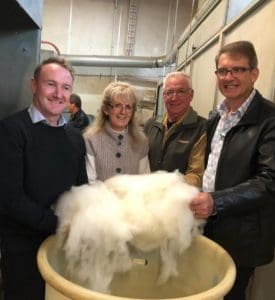
New cashmere deal – From left, Woolyarns international sales manager Andy May, Cashmere Connections’ Trisha Esson, cashmere producer Fred Garth and ACGA president Andrew James.
AUSTRALIAN cashmere producers are hoping prices of up to $200 a kilogram for dehaired superfine white down paid by New Zealand woollen spinner Woolyarns will rejuvenate the domestic industry.
And part of the Woolyarns deal includes growers signing onto a quality assurance or accreditation system covering animal welfare, clip preparation, human welfare and chemical use.
Australian cashmere production has fallen from a peak of about 70 tonnes hair-in in 1989 to less than 5 tonnes today, but the 12-month NZ price contract is expected to be an incentive to lift production.
Cashmere Connections owners Charles and Trisha Esson operate Australia’s only commercial cashmere dehairing plant at Bacchus Marsh and have been negotiating the Woolyarns deal with the Australian Cashmere Growers Association for the past 12 months.
The Woolyarns contract price of A$200/kg for dehaired white down under 14.5 micron is believed to be the highest contract price ever offered for dehaired Australian down. The NZ company is also paying a sliding scale of prices for coarser white and colored cashmere from 14.5-18 microns dehaired at Cashmere Connections. Growers will be paid less scouring and dehairing costs.
ACGA president Andrew James said the ACGA hoped the Woolyarns deal would provide reliability in cashmere pricing to enable growers to expand their production with confidence.
“There is almost nowhere that you can get cashmere dehaired in volume internationally, other than in China.”
He said there was an obvious strategic advantage for Australian growers in being able to dehair cashmere here and for overseas cashmere processors to buy the nation’s dehaired cashmere. The ACGA hoped to finalise the quality assurance system – currently called Cashmere Credentials – within a few months, Mr James said.
An increase in Australian cashmere production should be reasonably straight forward, Mr James said.
“We’ve got a good story to tell now.”
Woolyarns keen to sell the Australian cashmere story
Woolyarns international sales manager Andy May said the company is excited about partnering with Cashmere Connections and the ACGA to promote the exclusive and rare premium fibre.
“Woolyarns has a history of developing new innovative yarns with new fibres; we were the pioneers of Brushtail Possum blended yarns which we are now supplying into various international markets including Italy, Germany, Korea and China.
“We have strong connections into these markets including a Milan-based distributor who has over 40 agents throughout Italy, France and the rest of the world,” he said.
The partnership will support a fully Australasian-made story which has strong appeal globally, he said.
“The Australian cashmere fibre is both a light and warm fibre with an unique lustre which will offer vitality to our existing yarns, but the pinnacle will be a 100percent Australian cashmere yarn using the 14.5 micron fibre.
“We know this will excite the luxury brands and fashion houses in both Italy and France.”
Australian growers need to shear their goats
Trisha Esson said the Woolyarns agreement is exciting and would “most certainly” rejuvenate the Australian industry.
“This will be the first time I think that Australian cashmere will be used by itself as a stand-alone product and promoted as Australian cashmere.”
She said Woolyarns intends to market the finest Australian white cashmere to processors supplying high-end fashion houses in Europe, with other lines sold as cashmere throws, Merino and possum fibre blend yarns, and hand knitting yarns.
“This is not a one-off; because they are investing a lot of money in it, in developing products and marketing those products into Europe.
“You don’t build a market and then walk away from it.”
Mrs Esson said Australian cashmere is more lustrous and softer than cashmere from other sources.
“In the past Australian Cashmere has been predominantly sold to overseas buyers who have mixed it with cashmere from other origins and it has lost its identity and unique qualities.”
She estimated there are fewer than 100 Australian cashmere goat owners and many had not been shearing their goats. But she said goats reproduce quickly and rangeland goats can be upgraded quickly for cashmere production.
“We just have to get the word out to people that ‘OK come on, get your act together, get going again’.
“We need people to get out and shear their goats this year.”
Click here to view the Cashmere Connections-Woolyarns down price list.

This cashmere is stunning. Congratulations.
Well done Trish and Charles. The long haul for both of you has well and truly paid off. Congratulations.
Another fantastic Australian fibre project fostered by the team at Cashmere Connections. Our industry, its producers and end-users applaud your dedication and innovation.
Congratulations to Trisha and Charles of Cashmere Connections. You have worked so hard for the cashmere industry and the Australian processing industry.